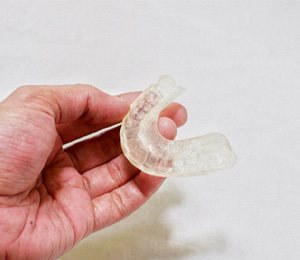 Infinity Dental Care
Infinity Dental Care
TMJ Treatment – Hillsboro, OR
Overcome Jaw Pain and Headaches

Do you suffer from frequent headaches? Do you struggle with persistent jaw pain? Is it difficult for you to chew certain foods? If so, you may be affected by a condition known as TMJ disorder, also called TMD. Fortunately, Dr. Aarati Kalluri offers effective therapies to help alleviate jaw pain and other unpleasant symptoms of TMJ disorder. Contact our office to schedule a consultation and learn more about your options for TMJ treatment in Hillsboro.
What Is TMJ Disorder?

TMJ dysfunction is a condition that affects the temporomandibular joints, muscles, and connective tissues surrounding the jaw. These two complex joints (one on either side of your head) help you open and close your mouth to chew your food, speak, laugh, and sneeze. When the joints become overworked and sustain additional tension and force, it can cause chronic pain and discomfort. According to the National Institutes of Health, over 10 million Americans are affected by TMJ disorder. Women are roughly twice as likely as men to experience TMJ issues.
Symptoms of TMJ Disorder

Patients with TMJ disorder may experience any of the following symptoms:
- Pain and tenderness in the jaw
- Clicking and popping jaw when you open and close your mouth
- Lockjaw
- Earaches or ringing in the ear (tinnitus)
- Neck and back pain
- Difficulty or pain while chewing
- Pain behind the eyes
- Limited mouth movement
- Change in bite
Types of TMJ Treatment

TMJ disorder can be caused by a variety of factors, including bite problems, past oral trauma, and bruxism. The type of treatment that will serve you best will depend on which underlying issues are contributing to your jaw pain. When you come in for your consultation, Dr. Kalluri will carefully examine your mouth to assess the situation. This may include ordering digital X-rays. She will also ask you to describe the symptoms you have been experiencing. Armed with this information, she may recommend one or more of the following types of TMJ treatment in Hillsboro.
Occlusal Splint

An occlusal splint is an oral appliance that prevents teeth grinding, a common contributor to TMJ disorder symptoms. Typically worn at night, an occlusal splint shifts the jaw in a slightly forward position. This helps the joints rest comfortably and provides long-term relief from chronic TMJ pain.
Equilibration/Occlusal Adjustment

Bite problems often contribute to TMJ dysfunction. When the upper and lower teeth do not work harmoniously together, it can place stress on the jaw joints. Fortunately, minor bite alterations can usually address this underlying issue. Occlusal adjustment involves buffing down the surfaces of certain restorations or teeth that are causing an uneven bite force. This treatment may help your facial muscles and connective tissues relax and ensure you can enjoy a more functional bite.
The best way to find out which TMJ treatment is right for you is to schedule a consultation with Dr. Kalluri, an experienced dentist in Hillboro. Don’t hesitate to give our office a call!
TMJ Treatment FAQs

Are you thinking of getting TMJ treatment in Hillsboro? That’s great news – it’ll definitely heal your aching jaw! Still, you probably have concerns you want to address first. Getting details about our TMJ fixes will raise your confidence in them. Luckily, we at Infinity Dental Care can help out: below are oft-asked questions TMJ questions and their answers. By reading these items, you’ll understand how our procedures work. If you need other facts, though, don’t hesitate to call our office!
Can TMJ Be Cured Permanently?
Yes, actually – the disorder can be permanently addressed. However, note that only some TMJ procedures have this effect. It’s thus vital to carefully consider your treatment options.
For example, take TMJ therapies like BOTOX and TENS. These methods offer genuine pain relief, but the results are usually temporary. They won’t address the underlying causes of your TMJ disorder.
In contrast, our office’s occlusal sprints and adjustments are different. They permanently fix jaw tension, misalignment, and other causes of TMJ disorder. As such, you can trust them to end your aches and discomfort for good.
Is TMJ Treatment Safe?
When done by a qualified professional, TMJ treatment is entirely safe. It won’t cause any lasting harm or soreness to your body.
You see, dentists take precautions when working on your jaw. They’re trained to treat TMJ disorder with minimally invasive and conservative methods. As a result, they’ll always suggest several options before resorting to surgery. (The latter approach, after all, carries several risks.)
These facts are evident in our office’s treatments. Occlusal splints and adjustments are proven to be overwhelmingly safe for you. Consequently, they’ll heal your aching jaw without causing side effects or complications.
How Long Does It Take for a TMJ Splint to Work?
Generally, TMJ splints take at least several months to work. That said, their effect following this period is a true end to your jaw pain.
It all comes down to how these splints function. Typically, you’ll wear one to bed every night for treatment. You might notice a quick reduction in symptoms, but they won’t disappear immediately. Your upper and lower jaws must first adjust to their new, healthier positions.
In most cases, splint patients have marked improvement after six weeks. Full relief typically takes between three and six months to occur. Of course, there are exceptions – not all patients are the same. Some people may experience slower or faster recovery times.
How Long Does Occlusal Equilibration Take for TMJ?
Equilibration – also known as occlusal adjustment – varies in how long it takes to work. Ultimately, the timing depends on the changes that must be made. Even so, most patients feel relieved once the bite and teeth are well-aligned.
The treatment timeline for equilibration also varies. Usually, a patient only needs to attend a few appointments (three at most) to complete the adjustments. The visits themselves are also relatively brief. That being the case, they won’t be too disruptive to your schedule.